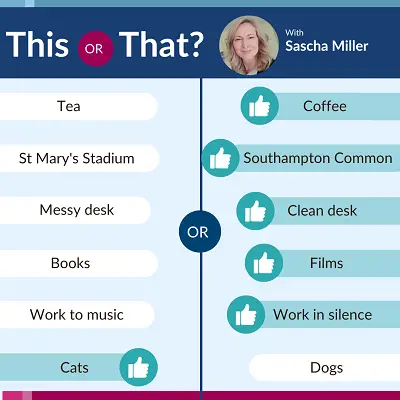Supporting better management of UTIs: Meet Sascha Miller
Southampton researchers are improving how people who experience recurrent urinary tract infections (UTIs) are supported.
UTIs usually clear up after a short course of antibiotics. However, recurrent UTIs are also common. The growing threat of antibiotic resistance makes this a concern.
Researchers in our NIHR Southampton Biomedical Research Centre (BRC) are improving understanding of barriers to care. This involves working closely with underserved communities.
The project is being driven by Dr Sascha Miller. She is a Senior Research Fellow at the University of Southampton.
Here, Dr Miller explains what she hopes to achieve through a one-year BRC Postdoctoral Bridging Fellowship.
How did you become interested in research?
I fell into research by luck. I’ve always been interested in health, and after doing a master’s in social psychology, I was looking for a practical way to apply that.
My first research job was at the Centre for Clinical and Community Applications of Health Psychology here at the University of Southampton. There, I found my niche! I worked on developing a digital intervention for infection prevention using the Person-Based Approach. This is still my field of work now.
I like that research is methodical and structured - but never boring as there’s always something new to learn. It suits me because it feels a bit like project management with more purpose and creativity. I love being part of work that has the potential to make a difference in people’s lives.
What is the healthcare challenge that you are seeking to address?
I’m currently looking at how to better support people who get recurrent urinary tract infections (rUTIs) and are from under-served communities. rUTIs are very common and really disrupt people’s lives. Treatment for rUTIs in primary care relies heavily on antibiotic use, contributing to antimicrobial resistance.
Whilst behavioural advice for managing them is available, seeking help and following advice can be challenging for people from underserved communities. This includes people experiencing economic deprivation, people from ethnic minority communities, neurodivergent people and people who identify as LGBTQ+.
My research is about working with these communities and understanding the barriers they face when it comes to care and self-management. The aim is to use what we learn to design support that’s genuinely helpful, inclusive and avoids over-reliance on antibiotics.

What do you hope to achieve in your research at the BRC?
My BRC Bridging Fellowship aims to lay the groundwork for an NIHR Early Career Researcher Award application. The goal is to develop an intervention to help people from underserved groups self-manage rUTIs. I’ll be co-designing the research with people with lived experience, so that it’s shaped by their needs from the outset.
The idea is to build something that leads to a useful, inclusive intervention in the future. We want it to be something that helps people manage their health in ways that work for them and reduces unnecessary antibiotic use.
Long term, I’d love to lead a programme of research that brings together behavioural science, digital tools and lived experience to tackle health inequalities in practical ways.
How would you sum up your fellowship in three words?
Inclusive, engaging, rewarding
What’s it like being an early career researcher in Southampton?
I moved over to the Primary Care Research Centre about three years ago, and it feels like home. There’s a great ECR community here; people are genuinely supportive, and there are lots of opportunities to get involved. I’m part of the Behavioural Science Group.
I’ve also joined two special interest groups (SIGs). These focus on neurodivergence and learning disabilities, and LGBTQ+ health. Both SIGs have been set up by ECRs, which says a lot about the culture here. I live some distance from Southampton, so being able to work remotely has been a big help. The flexibility that the department offers is also fantastic.
What advice would you give other early career researchers?
Don’t try to do it all alone! Having supportive peers and mentors has made a huge difference for me. They’re always there to offer helpful advice, bounce ideas around or remind me that other people are facing the same challenges. Building a network has been especially helpful when imposter syndrome creeps in - it’s easy to feel out of your depth when you’re surrounded by incredibly smart and experienced people.
As I’m working to become an independent researcher, I have started applying for small grants. I’ve had great support from peers and senior staff and have loved working on these projects.
I would recommend finding an area you’re genuinely interested in and passionate about. I’m especially motivated by working with members of the public. It doesn’t even feel like work most of the time because I enjoy it so much.